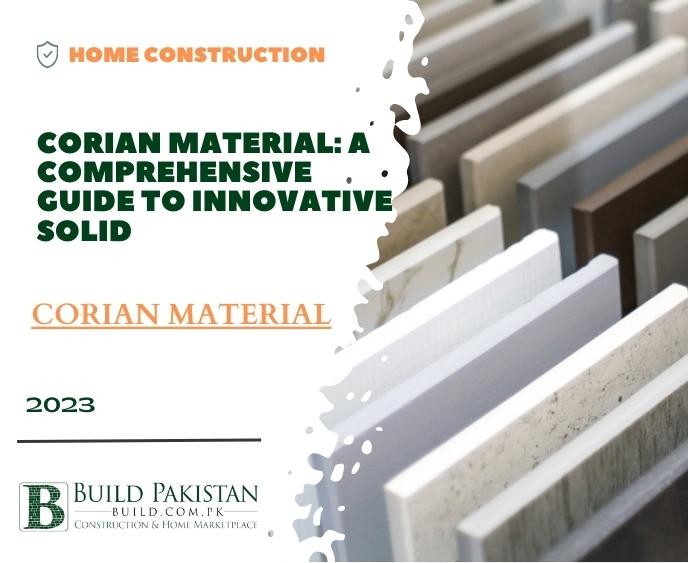Corian Material: A Comprehensive Guide to Innovative Solid

Introduction:
In the world of interior design and
architecture, materials play a pivotal role in shaping the e aesthetics,
functionality, and durability of spaces. One such versatile material that has
gained immense popularity in recent years is Corian. In this extensive guide,
we will explore Corian material, its composition, properties, applications,
benefits, drawbacks, and its impact on modern design and construction.
Understanding Corian Material:
Corian is a solid surface
material developed and manufactured by DuPont. It is composed of a unique blend
of acrylic polymer and natural minerals, primarily aluminum trihydrate derived
from bauxite ore. This combination results in a solid, non-porous surface that
offers exceptional design flexibility and performance.
Composition of Corian:
Corian's composition consists of
approximately 1/3 acrylic resin and 2/3 natural minerals. This unique blend
provides Corian with its distinctive characteristics, including durability,
versatility, and a wide range of design possibilities.
Properties of Corian Material
Corian boasts a remarkable set
of properties that make it a preferred choice for various applications:
Durability:
Corian is highly resistant to impact, scratches,
and stains, ensuring a long lifespan in both residential and commercial
settings.
Non-Porous:
Its non-porous surface prevents the growth of
mold, mildew, and bacteria, making it ide al for kitchen countertops and
bathroom surfaces.
Thermoformable:
Corian can be heated and molded into various
shapes and curves, allowing for seamless, integrated designs with no visible
seams.
Hygienic:
Its non-porous nature and ease of cleaning make
Corian a hygienic choice for surfaces in healthcare and foodservice
environments.
Color and Design Variety:
Corian is available in a wide range
of colors, patterns, and textures, allowing for endless design possibilities.
Translucency:
Certain Corian variations can be backlit,
creating stunning, translucent effects for applications like lighting and
partitions.
Applications of Corian Material
Corian's versatility makes
it suitable for an array of applications in both residential and commercial
settings:
Kitchen Countertops:
Corian is a popular choice for kitchen
countertops due to its durability, stain resistance, an d design flexibility.
Bathroom Surfaces:
It is often used for vanity tops, sinks,
and shower walls, where its non-porous nature is highly advantageous.
Furniture:
Corian can be crafted into tables, chairs, and
storage units, combining aesthetics with functionality.
Wall Cladding:
Corian panels are used for interior and
exterior wall cladding, providing a sleek and modern look.
Lighting:
Translucent Corian is used to create visually
striking lighting fixtures and illuminated surfaces.
Retail and Commercial Spaces:
Corian is widely employed in
retail displays, reception desks, and hospitality interiors.
Benefits of Corian Material
Corian offers several benefits,
making it a preferred choice for designers and architects:
Design Freedom:
Its ability to be shaped and molded allows
for innovative and unique designs that other materials may not achieve.
Durability:
Corian stands up to daily wear and tear,
maintaining its appearance for years.
Hygiene:
Its non-porous surface is easy to clean and
maintain, meeting stringent hygiene standards.
Sustainability:
Corian is recyclable, and DuPont has
established a recycling program to reduce environmental impact.
Drawbacks of Corian Material
While Corian is highly
versatile, it's essential to consider its limitations:
Heat Sensitivity:
Corian can be damaged by excessive heat, so
the use of trivets or hot pads is recommended.
Scratch Susceptibility:
While resistant to most scratches, it
may still be vulnerable to sharp objects or abrasive materials.
Cost:
Corian can be more expensive than some other countertop
materials, but its durability justifies the investment.
Conclusion:
Corian material represents a harmonious blend of
form and function, making it an excellent choice for various interior and
architectural applications. Its unique composition, properties, and design
flexibility have allowed designers and architects to push the boundaries of
creativity in modern construction. As Corian continues to evolve and adapt to
changing design trends and sustainability requirements, it remains a leading
material in the world of solid surface solutions, offering both timeless
elegance and lasting performance.









